View in other NatureServe Network Field Guides
NatureServe
Montana
Utah
Wyoming
Idaho
Wisconsin
British Columbia
South Carolina
Yukon
California
New York
Geyer's Willow - Salix geyeriana
General Description
Shrubs to 6 m. Twigs pubescent becoming somewhat glaucous. Leaf blades 2–7 cm long, narrowly lanceolate to elliptic with mostly entire margins, pubescent on both surfaces, glaucous beneath. Female catkins 1–2 cm long, emerging with the leaves on leafy branchlets up to 1 cm long; scales yellow to tan, short-hairy. Capsules hairy, 3–6 mm long; stipes 1–2 mm long; style <0.5 mm long (
Lesica et al. 2012. Manual of Montana Vascular Plants. BRIT Press. Fort Worth, TX).
Species Range
Montana Range
Range Descriptions
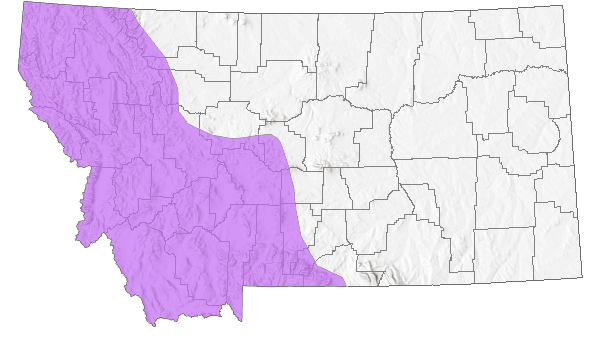
 Native
Native
Range Comments
BC to MT south to CA and NM (Lesica et al. 2012. Manual of Montana Vascular Plants. BRIT Press. Fort Worth, TX).
Observations in Montana Natural Heritage Program Database
Number of Observations: 345
(Click on the following maps and charts to see full sized version)
Map Help and Descriptions
Relative Density
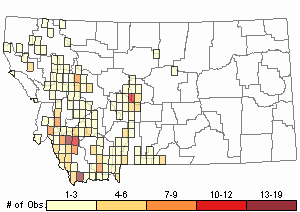
Recency
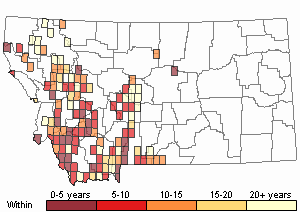
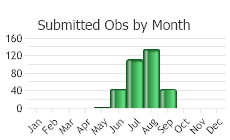
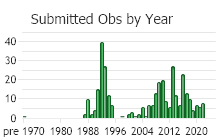
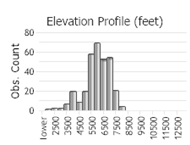 (Observations spanning multiple months or years are excluded from time charts)
(Observations spanning multiple months or years are excluded from time charts)
Habitat
National Vegetation Classification System Groups Associated with this Species
Wetland and Riparian
Riparian Shrubland
Ecology
POLLINATORS The following animal species have been reported as pollinators of this plant species or its genus where their geographic ranges overlap:
Bombus vagans,
Bombus bifarius,
Bombus fervidus,
Bombus frigidus,
Bombus huntii,
Bombus melanopygus,
Bombus ternarius,
Bombus terricola,
Bombus sitkensis,
Bombus occidentalis,
Bombus pensylvanicus,
Bombus bimaculatus,
Bombus griseocollis,
Bombus impatiens, and
Bombus suckleyi (Plath 1934, Macior 1968, Heinrich 1976, Thorp et al. 1983, Colla and Dumesh 2010, Colla et al. 2011, Koch et al. 2012, Williams et al. 2014).
Stewardship Responsibility
References
- Literature Cited AboveLegend:
 View Online Publication
View Online Publication Colla, S., L. Richardson, and P. Williams. 2011. Bumble bees of the eastern United States. Washington, DC: USDA Forest Service, Pollinator Partnership. 103 p.
Colla, S., L. Richardson, and P. Williams. 2011. Bumble bees of the eastern United States. Washington, DC: USDA Forest Service, Pollinator Partnership. 103 p. Colla, S.R. and S. Dumesh. 2010. The bumble bees of southern Ontario: notes on natural history and distribution. Journal of the Entomological Society of Ontario 141:39-68.
Colla, S.R. and S. Dumesh. 2010. The bumble bees of southern Ontario: notes on natural history and distribution. Journal of the Entomological Society of Ontario 141:39-68. Koch, J., J. Strange, and P. Williams. 2012. Bumble bees of the western United States. Washington, DC: USDA Forest Service, Pollinator Partnership. 143 p.
Koch, J., J. Strange, and P. Williams. 2012. Bumble bees of the western United States. Washington, DC: USDA Forest Service, Pollinator Partnership. 143 p. Lesica, P., M.T. Lavin, and P.F. Stickney. 2012. Manual of Montana Vascular Plants. Fort Worth, TX: BRIT Press. viii + 771 p.
Lesica, P., M.T. Lavin, and P.F. Stickney. 2012. Manual of Montana Vascular Plants. Fort Worth, TX: BRIT Press. viii + 771 p. Macior, L.M. 1968. Bombus (Hymenoptera, Apidae) queen foraging in relation to vernal pollination in Wisconsin. Ecology 49:20-25.
Macior, L.M. 1968. Bombus (Hymenoptera, Apidae) queen foraging in relation to vernal pollination in Wisconsin. Ecology 49:20-25. Plath, O.E. 1934. Bumblebees and their ways. New York, NY: Macmillan Company. 201 p.
Plath, O.E. 1934. Bumblebees and their ways. New York, NY: Macmillan Company. 201 p. Thorp, R.W., D.S. Horning, and L.L. Dunning. 1983. Bumble bees and cuckoo bumble bees of California (Hymenoptera: Apidae). Bulletin of the California Insect Survey 23:1-79.
Thorp, R.W., D.S. Horning, and L.L. Dunning. 1983. Bumble bees and cuckoo bumble bees of California (Hymenoptera: Apidae). Bulletin of the California Insect Survey 23:1-79. Williams, P., R. Thorp, L. Richardson, and S. Colla. 2014. Bumble Bees of North America. Princeton, NJ: Princeton University Press. 208 p.
Williams, P., R. Thorp, L. Richardson, and S. Colla. 2014. Bumble Bees of North America. Princeton, NJ: Princeton University Press. 208 p.
- Additional ReferencesLegend:
 View Online Publication
View Online Publication
Do you know of a citation we're missing? Ament, R.J. 1995. Pioneer Plant Communities Five Years After the 1988 Yellowstone Fires. M.Sc. Thesis. Bozeman, MT: Montana State University. 216 p.
Ament, R.J. 1995. Pioneer Plant Communities Five Years After the 1988 Yellowstone Fires. M.Sc. Thesis. Bozeman, MT: Montana State University. 216 p. Argus, G. 2010. Salix. In: Flora of North America Editorial Committee, eds. 1993+. Flora of North America North of Mexico. 16+ vols. New York and Oxford. Vol. 7.
Argus, G. 2010. Salix. In: Flora of North America Editorial Committee, eds. 1993+. Flora of North America North of Mexico. 16+ vols. New York and Oxford. Vol. 7. Baril, L.M. 2009. Change in deciduous woody vegetation, implications of increased willow (Salix spp.) growth for bird species diversity, and willow species composition in and around Yellowstone National Park's northern range. M.Sc. Thesis. Bozeman, Montana: Montana State University. 124 p.
Baril, L.M. 2009. Change in deciduous woody vegetation, implications of increased willow (Salix spp.) growth for bird species diversity, and willow species composition in and around Yellowstone National Park's northern range. M.Sc. Thesis. Bozeman, Montana: Montana State University. 124 p. Burkholder, B.O. 2015. Seasonal distribution, winter habitat selection and willow utilization patterns of the Shiras Moose on the Mount Haggin Wildlife Management Area. M.Sc. Thesis. Bozeman, Montana: Montana State University. 262 p.
Burkholder, B.O. 2015. Seasonal distribution, winter habitat selection and willow utilization patterns of the Shiras Moose on the Mount Haggin Wildlife Management Area. M.Sc. Thesis. Bozeman, Montana: Montana State University. 262 p. Burkholder, B.O., N.J. DeCesare, R.A. Garrot, and S.J. Boccadori. 2017. Heterogeneity and power to detect trends in Moose browse utilization of willow communities. ALCES 53:23-29.
Burkholder, B.O., N.J. DeCesare, R.A. Garrot, and S.J. Boccadori. 2017. Heterogeneity and power to detect trends in Moose browse utilization of willow communities. ALCES 53:23-29. Culver, D.R. 1994. Floristic analysis of the Centennial Region, Montana. M.Sc. Thesis. Montana State University, Bozeman. 199 pp.
Culver, D.R. 1994. Floristic analysis of the Centennial Region, Montana. M.Sc. Thesis. Montana State University, Bozeman. 199 pp. Dorn, R.D. 2010. The genus Salix in North America north of Mexico. 59 pp.
Dorn, R.D. 2010. The genus Salix in North America north of Mexico. 59 pp. Gaffney, W.S. 1941. The effects of winter elk browsing, South Fork of the Flathead River, Montana. Journal of Wildlife Management 5(4):427-453.
Gaffney, W.S. 1941. The effects of winter elk browsing, South Fork of the Flathead River, Montana. Journal of Wildlife Management 5(4):427-453. Hollenbeck, R.R. 1974. Growth rates and movements within a population of Rana pretiosa pretiosa Baird and Girard in south central Montana. Ph.D. Dissertation. Bozeman, Montana: Montana State University. 66 p.
Hollenbeck, R.R. 1974. Growth rates and movements within a population of Rana pretiosa pretiosa Baird and Girard in south central Montana. Ph.D. Dissertation. Bozeman, Montana: Montana State University. 66 p. Law, D.J. 1999. A comparison of water table dynamics and soil texture under black cottonwood recent alluvial bar, beaked sedge, and Geyer's/Drummond's willow communities. M.Sc. Thesis. Bozeman, MT: Montana State University. 68 p.
Law, D.J. 1999. A comparison of water table dynamics and soil texture under black cottonwood recent alluvial bar, beaked sedge, and Geyer's/Drummond's willow communities. M.Sc. Thesis. Bozeman, MT: Montana State University. 68 p. Lesica, P., M.T. Lavin, and P.F. Stickney. 2022. Manual of Montana Vascular Plants, Second Edition. Fort Worth, TX: BRIT Press. viii + 779 p.
Lesica, P., M.T. Lavin, and P.F. Stickney. 2022. Manual of Montana Vascular Plants, Second Edition. Fort Worth, TX: BRIT Press. viii + 779 p. Little, E.L., Jr. 1979. Checklist of United States trees (native and naturalized). Agriculture Handbook No. 541. U.S. Forest Service, Washington, D.C. 375 pp.
Little, E.L., Jr. 1979. Checklist of United States trees (native and naturalized). Agriculture Handbook No. 541. U.S. Forest Service, Washington, D.C. 375 pp. Manoukian, M.E. 1994. Evaluation of tall willows (Salix spp.) within a livestock grazing allotment in southwest Montana. M.Sc. Thesis. Bozeman, MT: Montana State University. 52 p.
Manoukian, M.E. 1994. Evaluation of tall willows (Salix spp.) within a livestock grazing allotment in southwest Montana. M.Sc. Thesis. Bozeman, MT: Montana State University. 52 p. Martinka, R.R. 1970. Structural characteristics and ecological relationships of male blue grouse (Dendragapus obscurus (Say)) territories in southwestern Montana. Ph.D Dissertation. Bozeman, MT: Montana State University. 73 p.
Martinka, R.R. 1970. Structural characteristics and ecological relationships of male blue grouse (Dendragapus obscurus (Say)) territories in southwestern Montana. Ph.D Dissertation. Bozeman, MT: Montana State University. 73 p. McColley, S.D. 2007. Restoring aspen riparian stands with beaver on the northern Yellowstone winter range. M.Sc. Thesis. Bozeman, MT: Montana State University. 67 p.
McColley, S.D. 2007. Restoring aspen riparian stands with beaver on the northern Yellowstone winter range. M.Sc. Thesis. Bozeman, MT: Montana State University. 67 p. Thompson, Scott K. 2002. Browse condition and trend on Montana ungulate ranges. M.Sc. Thesis. Bozeman, MT: Montana State University. 147 p.
Thompson, Scott K. 2002. Browse condition and trend on Montana ungulate ranges. M.Sc. Thesis. Bozeman, MT: Montana State University. 147 p.
- Web Search Engines for Articles on "Geyer's Willow"





